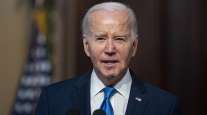ATA’s Graves Backs Sustainability Efforts, Praises EPA’s Fuel Economy Standard
This story appears in the Nov. 28 print edition of Transport Topics.
WASHINGTON — American Trucking Associations President Bill Graves applauded the trucking industry for its steps toward environmental sustainability, paying special attention to the SmartWay program and the fuel economy and greenhouse-gas emissions regulations published this year.
In a Nov. 17 speech to the Environmental Protection Agency’s Freight Sustainability Summit, Graves praised EPA and the National Highway Traffic Safety Administration for their work on fuel economy and greenhouse gas emissions standards for the trucking industry, which the agencies announced in August (8-15, p. 1).
“Federal regulations are not necessarily welcomed with open arms in any industry, and that’s certainly true for the trucking industry. But the joint EPA/NHTSA fuel efficiency standards were a very different situation,” he said. “EPA and NHTSA were very open and inclusive in the process of developing the joint rule.”
The regulations, Graves said, send the trucking industry “on a path toward greater fuel efficiency and cleaner air.”
Graves reflected on ATA’s path toward environmental sustainability, especially in the past decade.
“ATA had actually started down this path when we joined EPA as one of the 15 charter partners in the development and implementation of the SmartWay program back in 2002,” he said.
SmartWay is a voluntary EPA program in which trucking companies pledge to track statistics such as their fuel consumption and pollution and reduce them over a period of time. It also invites shippers that use the trucking industry to pledge to use SmartWay-participating carriers.
ATA worked with EPA, carriers and shippers to develop the program, which the agency said has exceeded its goals in reducing pollution and cutting fuel use (2-20-06, p. 27).
“SmartWay has been exactly the right voluntary approach for an industry that is not known for rushing to embrace government requirements,” Graves said, adding, “Talk about a win-win situation — this is it.”
ATA later introduced a six-part sustainability plan to focus its lobbying and membership re-lations efforts. Launched in 2008, the plan seeks to reduce truck idling, lower speeds on a national level, improve the industry’s fuel economy, increase truck size and weight and fix highway bottlenecks.
ATA served as a host for the Freight Sustainability Summit, where representatives of government, shippers, transportation and environmental advocacy joined to discuss the move toward environmental sustainability in freight transportation.
Before Graves spoke of trucking’s recent actions in environmental sustainability, he reflected on the industry of the 1950s, when the former governor of Kansas was born. Graves’ father started a trucking company in Kansas in 1935 and ran it until 1980, when he sold it, Graves said.
“Old grease, solvents, often got dumped wherever, usually along a fence line as a low-cost method of controlling weeds,” he said.
“The run-off from wash racks just disappeared down the storm drain . . . and the health impact of diesel and gas emissions was of no concern to anyone, at least anyone who was part of the mainstream,” Graves continued.
But Graves declared that the trucking industry “isn’t my father’s trucking industry anymore.”
“We chose the path of becoming proactive as an industry rather than reactive, and getting it right feels really good,” he said.



